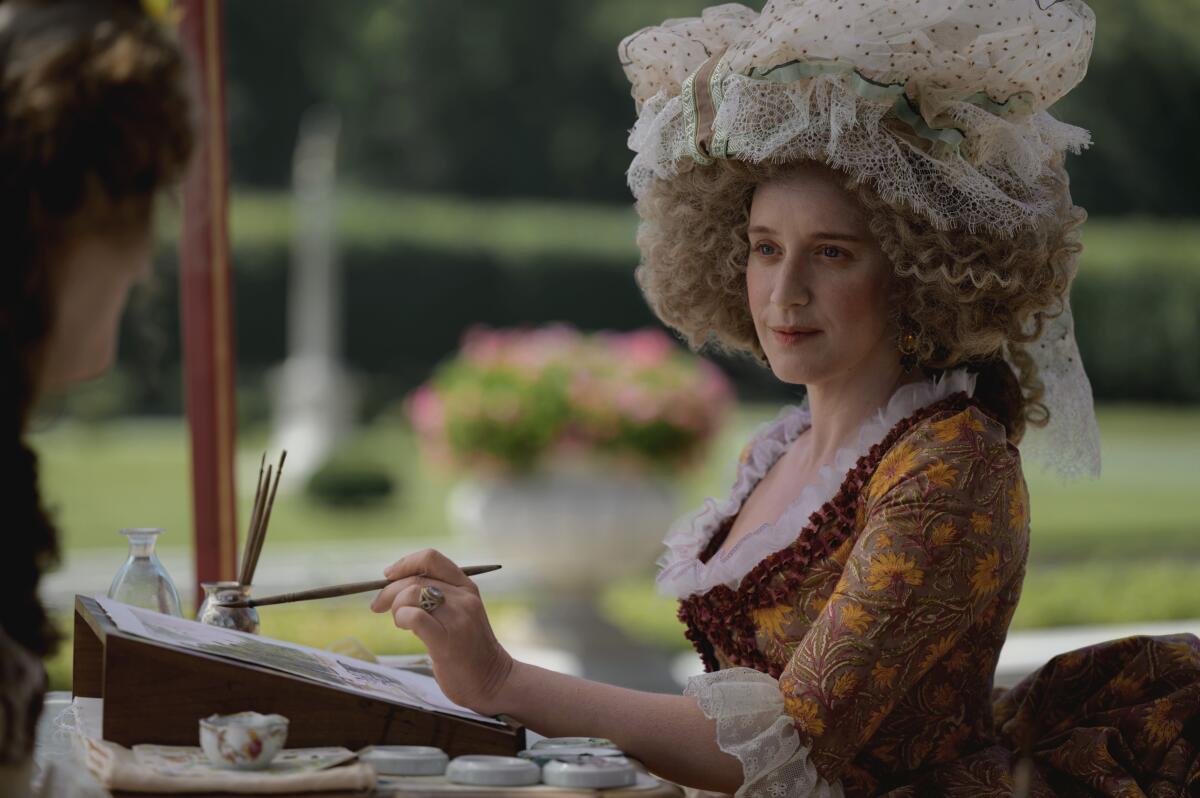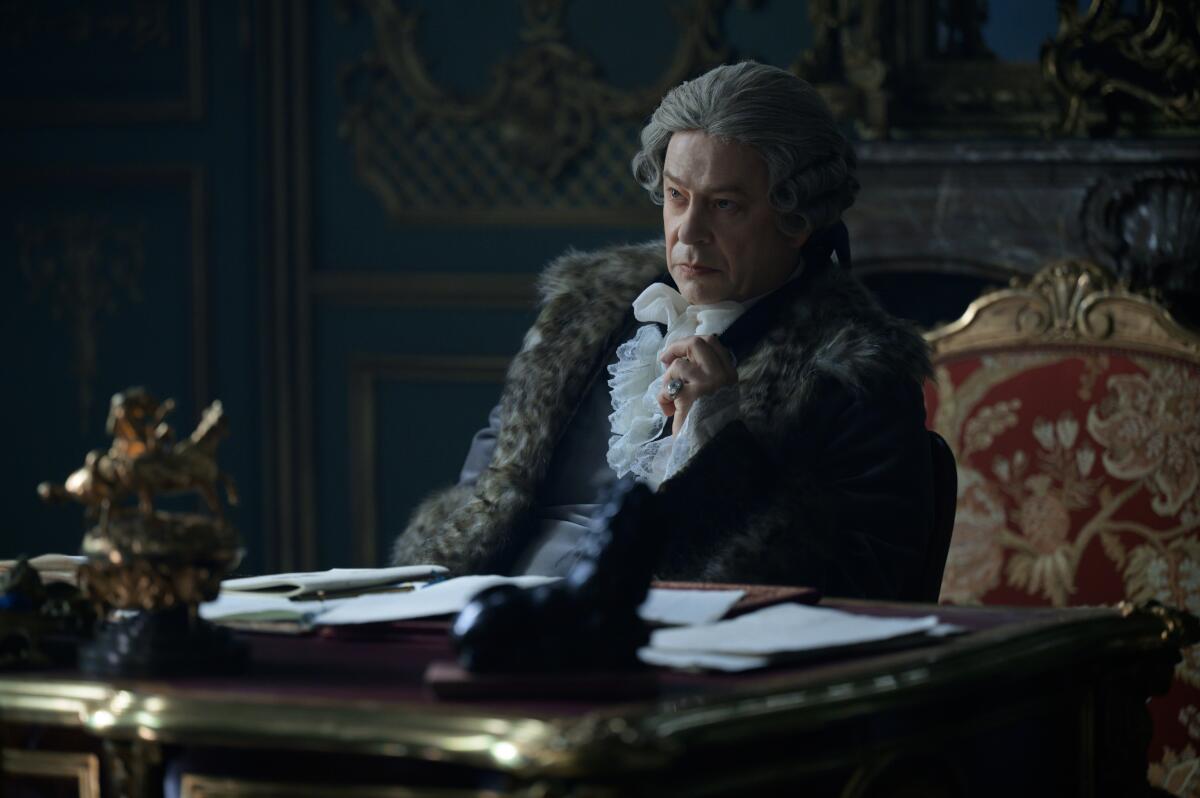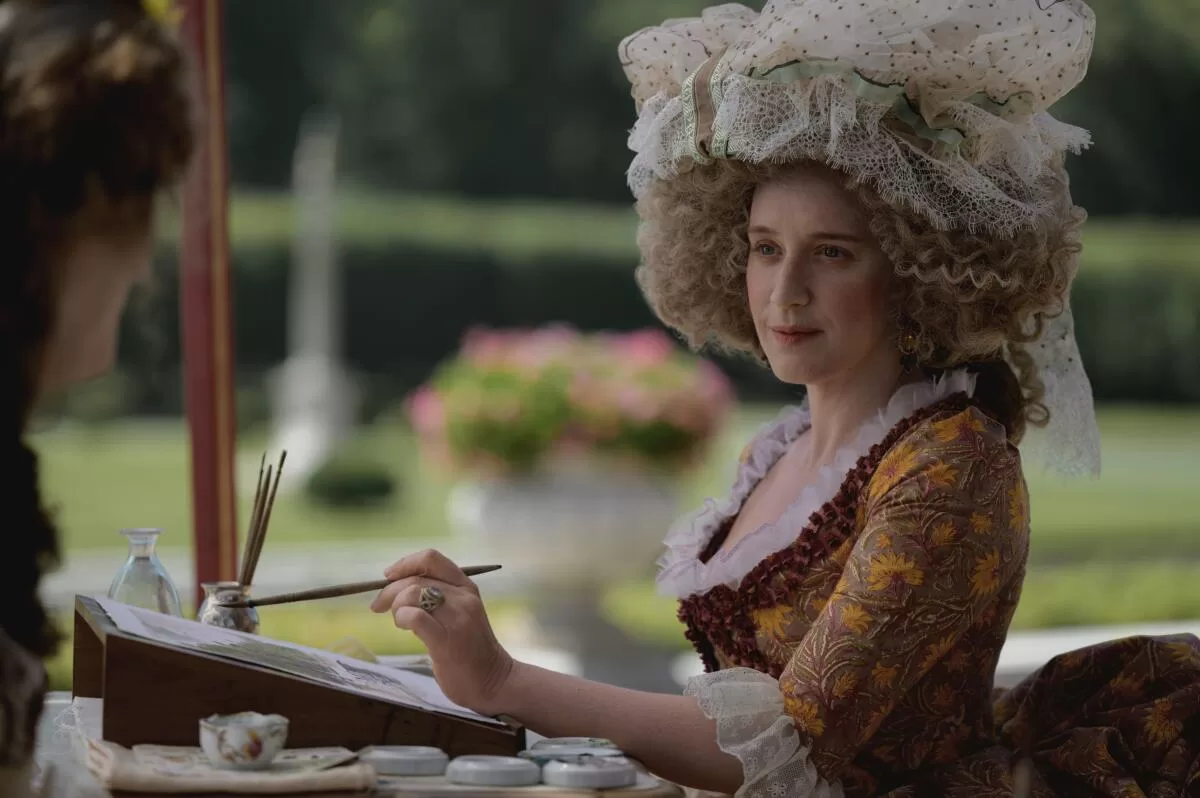In the very enjoyable if not always convincing “Franklin,” which premieres Friday on Apple TV+ and follows the founding father through seven of the nine years he spent in Paris, crafting an alliance with the French and negotiating a peace treaty with the British, he’s neither portly nor balding, but something of a hunk. Franklin’s notoriety in France has been regularly compared to that of a “rock star,” at least since that was a term, and though Douglas, 79, is technically too old for the role — Franklin was 77 when the Treaty of Paris ended the Revolutionary War in 1783 — we live in age of fit septuagenarian pop idols, and Franklin, in his seventies, was reportedly catnip to women. We might say, then, that the actor is playing the essence of the man, rather than the form.
Written top to bottom by Kirk Ellis and Howard Korder and directed by Tim Van Patten, “Franklin” is based on Stacy Schiff’s 2005 lively work of scholarship “A Great Improvisation: Franklin, France and the Birth of America” — which is to say, it borrows its research, changes some things, leaves much out and adds a bunch of stuff, as such projects have done before the movies could talk. It’s a handsome production, a feast for the costumers, the hair and makeup artists, the production designers and set decorators. The crowd scenes are well populated, which I ever regard as a sign of seriousness on the part of the producers, or whoever writes the checks to make that so. And the toy-theater credits are so good I watched them with close attention every time.
The eight-episode series begins in December 1776 as Franklin and his teenage grandson, Temple (Noah Jupe), who has come along to act as his secretary, are rowed ashore in Brittany on a cold and windy night. They make their way to Paris, where Franklin’s coach is mired in admiring crowds.
“They have it in their heads that I invented electricity,” Franklin explains. “Who am I to dissuade them?”

(Apple TV+)
The Franklins alight into the company of Edward Bancroft (Daniel Mays), who in this telling is conceived as Ben’s bosom buddy, personal physician and nonspecific sometime assistant, and (factually) a man with a secret. Other players are gradually introduced, portrayed with various degrees of historical fidelity. Having been told that he has connections at Versailles, Franklin approaches Pierre-Augustin Caron de Beaumarchais (Assaad Bouab) as he rehearses one of his “Figaro” plays. (There are some nice evocations of late 18th century show business through the series.) Beaumarchais, an exuberant sort who has a habit of referring to himself in the third person, is high on the American project and, when not plopped down in the prompter’s box, will smuggle arms to the rebels.
The wealthy merchant Jacques-Donatien Le Ray de Chaumont (Olivier Claverie) will lodge the Franklin party in a wing of his Passy estate, west of Paris, for the duration, where Franklin will establish a printing press and get chummy with his lovely neighbors: unhappily married Anne Louise Brillon de Jouy (Ludivine Sagnier), who plays the harpsichord and sits with him in the park making up stories about passersby like Woody and Diane in “Annie Hall”; and Anne Louise’s free-spirited, freethinking rival for his profligate affections, Anne-Catherine de Ligniville, Madame Helvétius (Jeanne Balibar), for whom he performs upon his famous glass armonica.
“You are terribly ancient,” she coos to him, “but you still have most of your hair.”
“Perhaps you’d like to fluff it,” Franklin replies.
Among the wining and dining, some work gets done. Thibault de Montalembert (Mathias from “Call My Agent”) plays Louis XVI’s foreign minister Charles Gravier, comte de Vergennes, the man Franklin has to convince to get the king to come to his side. De Montalembert’s somewhat weary authority makes De Vergennes seem like a fully formed human, more than most of the characters here; it’s an unusually warm performance for a person whose scenes are almost entirely centered on political gamesmanship. (That he has a smart wife, played by Isabelle Candelier, whose advice he takes, on work and clothing, makes us like him even more.) Many of Douglas’ best scenes are played opposite him.

Thibault de Montalembert plays Louis XVI’s foreign minister, Charles Gravier, comte de Vergennes, in “Franklin.”
(Apple TV+)
If the series does a thorough job of picturing the highlights of Franklin’s time in Paris, with its romance, intrigue and salon diplomacy — a subject colorful enough that it became a Broadway musical, the 1964 “Ben Franklin in Paris,” with “Music Man” Robert Preston in the title role — it’s less successful when following Temple’s largely imagined adventures. I would guess that at some point in the series’ development the grandfather-grandson relationship seemed a profitable peg on which to hang the narrative. And there was real-life drama in the family, involving Franklin’s son and Temple’s father, William Franklin, the royal governor of New Jersey, who supported the crown and plotted against the Americans, causing a rift never to heal, which is cataloged here if not explored. There is “errata in every man’s life,” says Franklin, ever the Philadelphia printer, when his grandson accuses him — fairly, unfairly, who are we to judge — of being a bad husband, parent, etc.
But the Temple storyline, which runs for the most part on a separate track from Franklin’s and occupies a good deal of screen time, seems designed primarily to get some roistering young people into a series dominated by sedentary middle-age and elderly folk. Horses are ridden, swords drawn, revelry reveled.
Invention is unavoidable in such a project, but the plotting around Temple feels increasingly unlikely — even in the fictionalized context it’s too goofy by half — to the point that the character himself becomes annoying. He falls in with not so much bad as boisterous companions, of whom the most serious is Gilbert du Motier, Marquis de Lafayette (Théodore Pellerin), itching to get to America and kill British soldiers. His friends fill his head with notions and dust his face with powder, and Paris, against whose temptations his grandfather has warned him, does the rest. It’s like a teenage “Rake’s Progress.” Will Temple come to his senses in time to witness the Treaty of Paris, concluded with late-arriving John Adams (Eddie Marsan), Franklin’s temperamental nemesis — his frenemesis — forever incensed over what he sees as the older man’s devil-may-care attitude to just about everything?
Douglas has opted for a strangely dry, deliberate delivery, which, for all anyone knows, might be exactly the way Franklin spoke. (The Ben I hear in my head is the one played by Stan Freberg on his album “Stan Freberg Presents the United States of America Volume One: The Early Years,” and that is surely not accurate.) Paradoxically — or perhaps not, since we are in Paris where Franklin is the foreigner — this “natural” American, who eschews the fripperies of fashionable dress for a trapper’s fur hat and simple cloth clothing, comes off a little stiff. Or perhaps he is being subtle. His most dynamic scenes show him working wordlessly at his printing press; they give us a taste of Franklin’s capability and Douglas’ own.
And as to Franklin’s chronologically asymmetrical flirtations, well, let’s remember who’s married to Catherine Zeta-Jones.
